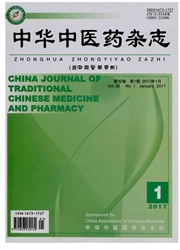

 中文摘要:
中文摘要:
目的:研究柴胡疏肝散对围绝经期综合征(PMS)肝郁证大鼠行为学的影响及对海马细胞外调节蛋白激酶(ERK1/2)mRNA表达水平的作用机制。方法:选择13月龄雌性大鼠,采用慢性束缚法制备围绝经期综合征肝郁证模型,以3月龄成年大鼠为正常对照组,经过3周的柴胡疏肝散干预后,对大鼠进行Open-field test行为学评分;采用定量PCR法检测大鼠海马中ERK1/2的表达变化。结果:PMS肝郁证治疗组大鼠Open-field水平运动得分、垂直运动得分均高于模型组(P〈0.05);ERK1组间比较无统计学差异,治疗组ERK2表达高于模型组,差异具有统计学意义(P〈0.05)。结论:柴胡疏肝散能够改善PMS肝郁证大鼠行为,其作用的部分机制可能与提高海马中ERK2的表达相关。
 英文摘要:
英文摘要:
Objective: To investigate the effects of Chaihu Shugan Powder on the behavior and hippocampus ERKI/2 mRNA expression in the rat model of perimenopausal syndrome (PMS) with liver stagnation syndrome. Methods: The 13 months old female rats were treated by chronic restraint stress for establishing the rat model of PMS with liver stagnation syndrome. Three months old female rats were selected as normal control group. The model group was intragastric administered with Chaihu Shugan Powder for succesive 3 weeks. The rat behavioral scoring was observed by open-field test. The ERK1/2 mRNA expression in hippocampus was detected by Real time quantitative PCR. Results: Compared with the model group, the horizontal and vertical scores of the Chaihu Shugan Powder group were reduced significantly (/〈0.05). There was no difference in ERK1 mRNA among these groups. ERK2 mRNA expression in the Chaihu Shugan Powder group was higher than that in the model group, with statistical differences (P〈0.05). Conclusion: Chaihu Shugan Powder can effectively improve the behavior of the rat model of PMS with liver stagnation syndrome, the mechanism of which may be related with increasing the ERK2 expression in hippocampus.
 同期刊论文项目
同期刊论文项目
 同项目期刊论文
同项目期刊论文
 期刊信息
期刊信息
